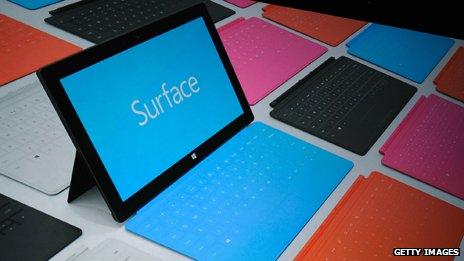Microsoft's Surface: Technology experts' reactions
- Published

Many analysts agree that the product is nice, but it remains to be seen how well it will be received by consumers
As Microsoft announces a new tablet, technology experts offer their first impressions of the device, as well as insights into what the product could mean for Microsoft and its rivals.
The BBC has compiled a round-up of what some of them are saying.
Dan Farber, CNET
<link> <caption>Microsoft has more than 90% market share of desktops</caption> <url href="http://news.cnet.com/8301-1035_3-57455261-94/why-microsoft-built-its-own-tablet-think-apple-and-xbox/" platform="highweb"/> </link> , compared with 6% for Apple.
But in the mobile world, the roles are reversed. Microsoft is barely a blip on the mobile scene, while Apple and Google are running away with the fast-growing market. The number of mobile internet users is expected to exceed desktop internet users beginning in 2014, according to ComScore.
Microsoft got the message in introducing the Surface line of mobile devices, taking a page from Apple's total-control product strategy and its own Apple-like approach to the Xbox over the last decade.
Melissa J Perenson, PC World
<link> <caption>Microsoft's introduction of its Surface tablet</caption> <url href="http://www.pcworld.com/article/257852/microsoft_surface_tablet_initial_impressions.html" platform="highweb"/> </link> engendered buzz like no other we've seen from Microsoft. The big question is, does it stand up to the hype? The answer, succinctly, is yes.
After the event, attendees got a brief audience with the Surface (the second Microsoft product to get that name; prior to today, "Surface" referred to Microsoft's table-top touchscreen computer experience). I saw it up-close, and in limited action, and was very impressed with what I saw.
For starters, Microsoft truly has paid close attention to the details. This tablet is one of the few with a full-sized USB port - and thank goodness for that. The Windows RT version of Surface has USB 2.0, with USB 3.0 on the Windows 8 Professional version.
Erik Sherman CBS News
<link> <caption>The pressure is on Microsoft to deliver, for the first time</caption> <url href="http://www.cbsnews.com/8301-505124_162-57455753/microsoft-tries-to-out-tablet-apple/" platform="highweb"/> </link> , a computer under its own brand, rather than software running on another company's hardware. To that end, the software giant is promising a device that could potentially win favour among some users, although full specs aren't yet available, let alone hands-on reviews. A 10.6-inch-wide display will support widescreen HD video, although probably not at the ultra-high resolution of the iPad's Retina display.
Dina Bass, Andy Fixmer and Cliff Edwards, Bloomberg
<link> <caption>Microsoft's entry into the tablet market</caption> <url href="http://mobile.bloomberg.com/news/2012-06-19/microsoft-unveils-surface-tablet-computer-taking-on-ipad-1-" platform="highweb"/> </link> also comes as challengers such as Hewlett-Packard and RIM have failed to derail Apple's dominance with their own tablets. The worldwide tablet market is estimated to reach $79bn this year, according to research firm DisplaySearch.
Microsoft is also teaming up with PC makers like Acer, Toshiba and Asustek to build tablets with Windows 8, which will be called Windows RT for versions running on ARM-based chips.
Working with partners is Microsoft's more traditional way of operating. Apple's success with the iPad may be pushing the company to seek greater control over the hardware design so it works seamlessly with the software, like Apple does.
Peter Bright, Arstechnica
<link> <caption>Microsoft's intent with the Surface tablets</caption> <url href="http://arstechnica.com/information-technology/2012/06/a-first-look-and-feel-of-microsofts-first-pc/" platform="highweb"/> </link> is to create hardware that puts the software front and centre, to provide the hardware necessary to allow Windows 8's strengths to really come to the foreground. At the launch event, however, the software took the back seat. This was all about the hardware, and with good reason.
The Surface tablets are smart, good-looking, carefully considered, well-built, slick pieces of kit and there's nothing even close on the market today. Of course, they're not on the market today either, but unless the PC OEMs inject a serious dose of quality in their build and design processes, the Surface units will stand alone when they eventually go on sale.
What makes Surface special is the attention to detail. The standard of the fit and finish of the prototypes on display was extremely high. The shell of the Surface is made of cast magnesium, with a vapor-deposited finish called VaporMg. The result is an attractive, scratch-resistant finish that's easy to grip and comfortable to hold.
Brad McCarty, The Next Web
<link> <caption>You could say that it's a direct competitor</caption> <url href="http://thenextweb.com/microsoft/2012/06/19/the-microsoft-surface-launch-a-display-of-simultaneous-winning-and-failure/" platform="highweb"/> </link> to the iPad, and you'd be right. But you'd also be right to say that it's a competitor to the MacBook Air. This is a laptop, every bit as much as it's a tablet. The detachable keyboard cover is slick, and if it works as good as it looks, it's a no-brainer to take it with you everywhere.
So if the device is nice, and has huge potential in the market, where did Microsoft go wrong? Let's talk about it, starting with the fact that there's no availability.
If there's one thing that Microsoft could learn from Apple, it is "announce and ship". Today we saw the Surface. When can we buy it? The only thing we know is that it will be available in conjunction with the release of Windows 8: That is to say, 'not today'.
We also don't know the price. We have a range, but not even a solid one. The RT model will be priced in line with other ARM-based tablets, and the Pro version will hit the range of "Intel-based Ultrabooks". In case you've not been following along, Ultrabooks have a price range from somewhere around $500 (£320) to upwards of $1,200 (£766), depending on the model. You simply can't be that vague with a device that holds such an iconic potential.
To make matters worse, the device is either a Surface or a Surface Pro. The former being the Windows RT version (read: stripped-down, cheaper) and the latter being the Windows 8 device. Nomenclature is important - and Microsoft sorely missed the boat here.
- Published19 June 2012
- Published4 June 2012
- Published1 June 2012
- Published1 June 2012